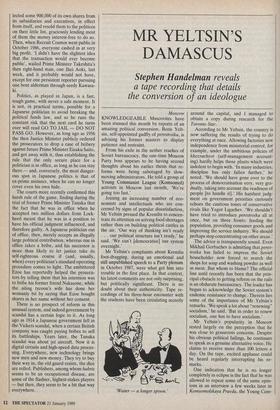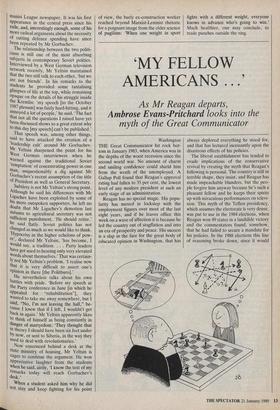MR YELTSIN'S DAMASCUS
Stephen Handelman reveals a tape recording that details the conversion of an ideologue
Moscow KNOWLEDGEABLE Muscovites have been stunned this month by reports of an amazing political conversion. Boris Yelt- sin, self-appointed gadfly of perestroika, is advising his former masters to display patience and restraint.
From his exile in the nether reaches of Soviet bureaucracy, the one-time Moscow Party boss appears to be having second thoughts about his earlier thesis that re- forms were being sabotaged by slow- moving administrators. He told a group of Young Communist League (Komsomol) activists in Moscow last month, 'We're going too fast.'
Joining an increasing number of eco- nomists and intellectuals who are con- cerned by signs of popular dissatisfaction, Mr Yeltsin pressed the Kremlin to concen- trate its attention on solving food shortages rather than on building political castles in the air. 'Our way of thinking isn't ready . . our political structure isn't ready,' he said. 'We can't [democratise] Our system overnight.'
Mr Yeltsin's complaints about Kremlin foot-dragging, during an emotional and still unpublished speech to a Party plenum in October 1987, were what got him into trouble in the first place. In that context, his latest comments are not only surprising, but politically significant. There is no doubt about their authenticity. Tape re- cordings of his three-hour encounter with the students have been circulating secretly 'Waiter — a longer spoon.' around the capital, and I managed to obtain a copy during research for the Toronto Star.
According to Mr Yeltsin, the country is now suffering the results of trying to do everything at once. Allowing factories new independence from ministerial control, for example, under the ambitious policies of khozrachyot (self-management account- ing) hardly helps those plants which were indolent to begin with. 'In many industries, discipline has only fallen further,' he noted. 'We should have gone over to the process of democratisation very, very gra- dually, taking into account the readiness of people [to handle it].' His harshest judg- ment on government priorities curiously echoes the cautious tones of conservative rivals like Yegor Ligachev. 'We shouldn't have tried to introduce perestroika all at once, but on three fronts: feeding the population, providing consumer goods and improving the service industry. We should perhaps stop concentrating on other areas.'
The advice is transparently sound. Even Mikhail Gorbachev is admitting that peres- troika has failed to impress the Soviet householder now forced to search the shops for soap and washing powder as well as meat. But whom to blame? The official line until recently has been that the prin- cipal obstacle to getting reform on the rails is an obdurate bureaucracy. The leader has begun to acknowledge the Soviet system's endemic resistance to change. Therein lies some of the importance of Mr Yeltsin's remarks. 'We speak a lot about "renewing" socialism,' he said. 'But in order to renew socialism, one has to have socialism.'
Mr Yeltsin's popularity in Moscow rested largely on the perception that he was close to grassroots concerns. Despite his obvious political failings, he continues to speak as a genuine alternative voice. He claims to receive more than 100 letters a day. On the tape, excited applause could be heard regularly interrupting his re- marks.
One indication that he is no longer completely in eclipse is the fact that he was allowed to repeat some of the same opin- ions in an interview a few weeks later in Komsomolskaya Pravda, the Young Com- munist League newspaper. It was his first appearance in the central press since his exile, and, interestingly enough, some of his more radical arguments about the necessity of cutting defence spending have since been repeated by Mr Gorbachev. The relationship between the two politi- cians is still one of the most absorbing subjects in contemporary Soviet politics. Interviewed by a West German television network recently, Mr Yeltsin maintained that the two still talk to each other, 'but we are not friends'. In his remarks to the students he provided some tantalising glimpses of life at the top, while remaining Opaque on the details of his struggle inside the Kremlin: 'my speech [to the October 1987 plenum] was fairly hard-hitting, and it annoyed a lot of people,' he said. 'The fact that not all the questions I raised have yet been discussed shows to a great extent why to this day [my speech] can't be published.' That speech was, among other things, said to have attacked the creation of a 'leadership cult' around Mr Gorbachev. Mr Yeltsin sharpened the point for his West German interviewers when he warned against the traditional Soviet 'temptation' of concentrating power in one man, unquestionably a dig against Mr Gorbachev's recent assumption of the title of President as well as General Secretary. Subtlety is not Mr Yeltsin's strong point. Although he said his differences with Mr Ligachev have been exploited by some of his more outspoken supporters, he left no doubt that Mr Ligachev's demotion last autumn to agricultural secretary was not sufficient punishment. He should retire,' he said flatly. Soviet politics has not changed as much as we would like to think. 'Hypocrisy in the higher echelons of pow- er', declared Mr Yeltsin, 'has become, I would say, a tradition. . . . Party leaders have got used to hearing only very elevated words about themselves.' That was certain-
ly not Mr Yeltsin's problem. 'I realise now that it is very. difficult to assert one's °Pinion in there [the Politburo].'
He nevertheless talks about his own battles with pride. 'Before my speech at the Party conference in June [in which he appealed for "rehabilitation"],, they wanted to take me away somewhere, but I said, "No, I'm not leaving the hall," be- cause I knew that if I left, I wouldn't get back in again.' Mr Yeltsin apparently likes to think of himself as being constantly in danger of martyrdom: 'They thought that in theory I should have been six feet under by now, or sent to Siberia, in the way they used to deal with revolutionaries.'
Now ensconced behind a desk at the state ministry of housing, Mr Yeltsin is eager to continue the argument. He won appreciative laughter from the students' When he said, airily, 'I know the text of my remarks today will reach Gorbachev's desk.'
When a student 'asked him why he did not stay and keep fighting for his point of view, the burly ex-construction worker reached beyond Marxist-Leninist rhetoric for a poignant image from the older science of pugilism: 'When one weight in sport fights with a different weight, everyone knows in advance who's going to win.' Much healthier, one may conclude, to trade punches outside the ring.



























































 Previous page
Previous page